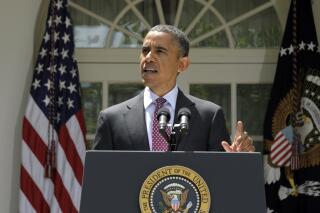Obama didn’t keep millions of classified White House documents

President Barack Obama gives a statement in the Rose Garden of the White House in Washington, June 15, 2012. After leaving office, Obama’s records were transferred to the National Archives and Records Administration. (AP Photo/Susan Walsh, File)
CLAIM: Former President Barack Obama took 30 million documents, many of them classified, to Chicago upon leaving the White House.
AP’S ASSESSMENT: False. Obama administration records are exclusively held and maintained by the National Archives and Records Administration, the federal agency confirmed on Friday. Millions of unclassified documents were transferred after Obama left office to a NARA facility in Chicago, but neither Obama’s personal foundation nor the facility set to house his presidential memorabilia have control over those papers.
THE FACTS: Amid mounting revelations surrounding the FBI’s search of former President Donald Trump’s Mar-a-Lago estate, a counternarrative pushed online — including by Trump himself — posits that Obama similarly kept possession of White House documents after his term of office.
“President Barack Hussein Obama kept 33 million pages of documents, much of them classified. How many of them pertained to nuclear? Word is, lots!” Trump posted on Truth Social, the social network he founded, on Friday.
“OBAMA TOOK 30 Million Documents when he left the WHITEHOUSE and No FBI RAID,” read one tweet posted Tuesday, the day after the FBI’s search, that had garnered almost 20,000 likes by Friday.
But these records were given to NARA in 2017, upon the end of Obama’s term, and they remain in NARA’s sole custody, in accordance with federal law. Some 30 million documents were moved to a NARA-operated facility in the Chicago area, as the agency explained in a statement Friday, but none were classified. The administration’s classified documents are stored in a separate NARA facility in the Washington, D.C., area.
Presidential libraries are managed by NARA, and the documents therein belong to the agency, which also manages related public records requests. But the Obama Presidential Library has no physical location; it’s the first to be wholly virtual. Some 95 percent of Obama administration documents were “born digital,” meaning they have no “hard-copy” version and don’t need to be digitized, per NARA.
Separately, construction began in 2021 on the Obama Presidential Center, a complex in Chicago managed by the privately-run Obama Foundation. But because the center will not be affiliated with NARA, the Obama Foundation will need to request to borrow any artifacts or records intended for display there from the government. The foundation did provide funding to NARA for digitizing the Obama administration’s paper documents, but NARA itself is responsible for actually handling them, according to the agency.
A spokesperson for Trump did not immediately respond to a request for comment.
Benjamin Hufbauer, a professor at the University of Louisville and a researcher of presidential libraries, reiterated that no White House records remain in Obama’s personal possession. They are “owned by the nation,” he told The Associated Press in an email.
The FBI retrieved “top secret” records from Mar-a-Lago, including some with particularly sensitive information, according to court papers released Friday, the AP reported Friday. The warrant authorizing the search says agents were investigating possible violations of three federal laws, including rules surrounding the gathering and transmission of defense information under the Espionage Act.
The fact that such secret papers were reportedly seized directly from Trump’s estate is the key distinction between Trump’s records and Obama’s, Hufbauer said. “Even if there are duplicate copies of these documents in the National Archives (which there almost certainly are), sensitive documents about, say, nuclear secrets, are to be housed in a secure facility, and access to them is very tightly controlled,” he said.
___
This is part of AP’s effort to address widely shared misinformation, including work with outside companies and organizations to add factual context to misleading content that is circulating online. Learn more about fact-checking at AP.
